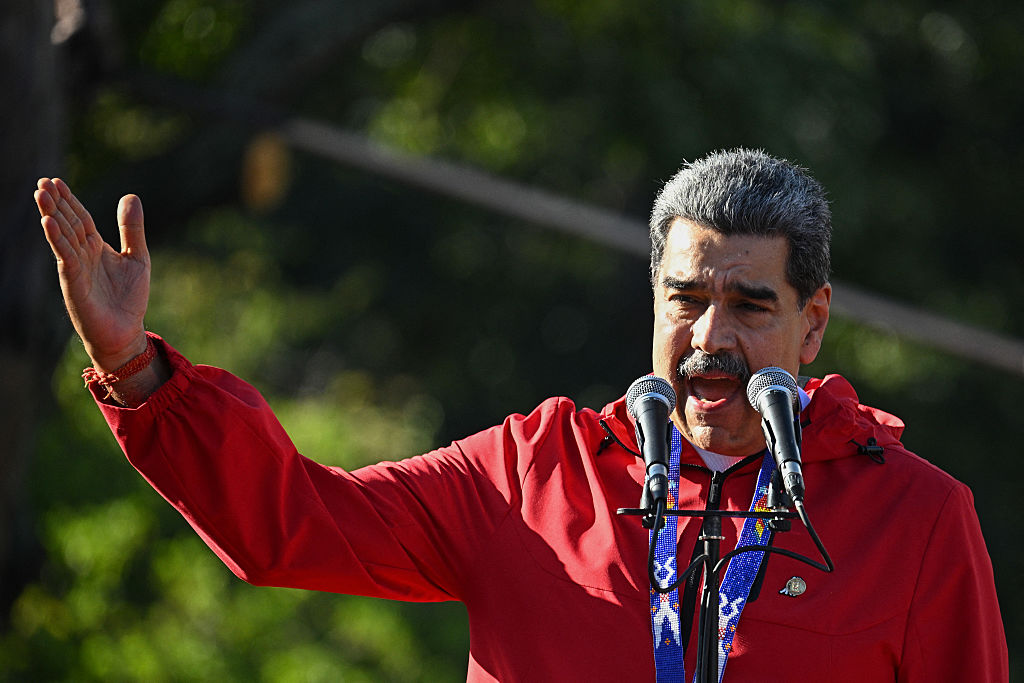Maduro Is Not the Worst Case for Venezuela
The real narco kingpins are waiting in the wings.

The U.S. seems poised to launch its largest intervention in Latin America in at least 35 years, as military assets continue to accumulate in the theater surrounding Nicolás Maduro’s Venezuela. The Trump administration has made it clear that removing Maduro from power is one of its major objectives, branding the dictator an illegitimate narcoterrorist responsible for a vast operation of crime and death on American soil.
While there is no doubt that Maduro is a tyrant that has oppressed and impoverished Venezuelans during his long years at the head of the Bolivarian Republic, his rule over the country is not the worst case scenario for Venezuela.
That may seem absurd, given the depths the country has plumbed under his rule: the complete collapse of the economy, the terror of the secret police, a population at times on the verge of starvation, a massive wave of refugees streaming across the hemisphere in search of more hospitable situations. But the sad lesson of human history is that the wells of misery are rarely exhausted—things can almost always get worse.
For Venezuela, that threat comes in the form of the cartels. Currently, Venezuela exists principally as a point of transit in the cartel drug trafficking network. Thousands of pounds of Colombian cocaine pass through Venezuela every day on their way north to the lucrative American market, often being run by air to unmarked runways in Central America. This transport is winked at and even at times facilitated by Maduro and the Venezuelan government in return for a cut of the profits. But the cartels have a limited foothold in the country. If they get too assertive, Maduro is happy to exert the full force of the state against them; he has no interest in permitting organized criminals to form real alternative power centers.
But that situation could easily change. There is nothing inherent to Venezuela that prevents cartels from entrenching themselves as quasi-state actors capable of contesting the control of territory and waging protracted war against the central government, as has been the case in neighboring Colombia or the more lawless portions of Mexico for decades. The struggle against the narco-revolutionaries in Colombia nearly destroyed the nation during the latter half of the 20th century, and only a brutal and painstaking fight has allowed the nation to regain the semblance of order and sovereignty.
If the Venezuelan government crumbles, either by means of covert operations or a military intervention from the U.S., the only power that is keeping the cartels at arm’s length (albeit by means of generous concessions and a great deal of corruption) will disappear. Any new government, even with the help of an American occupying force, would be largely incapable of managing and projecting force into the far-flung reaches of the country, especially the portion of the Amazon that characterizes the southernmost region of Venezuela.
This would open a golden opportunity for cartels like the National Liberation Army (ELN), which controls significant territory just across the border and already frequently travels through Venezuelan territory between clashes with the Colombian government. The cartels are likely to be significant beneficiaries of any conflict in Venezuela that topples the government, because they are well positioned with nearby strongholds and pre-existing connections to Maduro supporters in the government and military. The remaining supporters of the Bolivarian revolution would be left with little recourse but guerrilla warfare—and the ELN and its competitors provide the perfect platform for such operations. They would undoubtedly be delighted to accommodate the fragments of the old regime—and to expand their powerbase across the Colombia–Venezuela border.
Maduro may be oppressive, but his regime is paradisiacal in comparison to the brutal reality of cartel warfare. The result of American intervention may well be a chavista Long March to the Amazon, plunging Venezuela into a terrible, drug-fueled civil war that could last for decades. It would also almost certainly involve American soldiers in some of the most horrific guerrilla fighting on the planet—some of whom would come home in a casket.
Subscribe Today
Get daily emails in your inbox
For this reason, a peaceful and orderly transition of power away from Maduro is the preferable result of American pressure on Venezuela. Such a transition lacks, of course, the catharsis of overthrowing the regime by force, and unfortunately permits the principal perpetrators to escape their earthly just deserts. But it avoids the creation of a power vacuum during the process of redemocratization, and sharply reduces the probability of introducing permanent guerrilla conflict into the country—a situation clearly at odds with American interests in Venezuela.
Thankfully, that option appears to be on the table. The Venezuelan government reportedly offered the Trump administration a plan for Maduro to gradually step down and hand power off at the end of his current presidential term, a remarkable step that demonstrates both the immensity of the pressure the U.S. is exerting on the Maduro regime and that Maduro is considering whether it might be rational to get out while the getting is good (or at least not yet catastrophically bad). The offer was rejected—likely at least in part because the timescale proposed would have meant no change until the very end of Trump’s second term—but the very proposition may mean that, with further pressure, a more suitable settlement could be reached.
Such a settlement would be a signal achievement for the Trump administration’s foreign policy in Latin America, and it would avoid very real risks both for the people of Venezuela and for any potential American forces involved in the intervention.